If you’re starting your AI journey in 2025, these 13 beginner books are perfect for gaining accessible, practical insights into AI tools, applications, and ethics. They use simple language, visuals, and exercises designed for non-tech-savvy folks, seniors, or curious beginners. Each book covers foundational concepts like chatbots, voice cloning, and responsible use, helping you build confidence before exploring deeper. Keep exploring, and you’ll soon discover the full potential of AI in everyday life.
Key Takeaways
- Focuses on beginner-friendly titles that simplify AI concepts with practical examples and visual aids for 2025 learners.
- Highlights books emphasizing ethical use, societal impacts, and real-world applications suited for non-technical audiences.
- Recommends resources that combine foundational knowledge with hands-on exercises, prompts, and accessible language.
- Includes titles that cater to seniors, entrepreneurs, and curious learners seeking approachable AI introductions.
- Suggests supplementary tools like tutorials, community forums, and downloadable prompts to enhance beginner learning.
AI for Beginners: How to Use AI
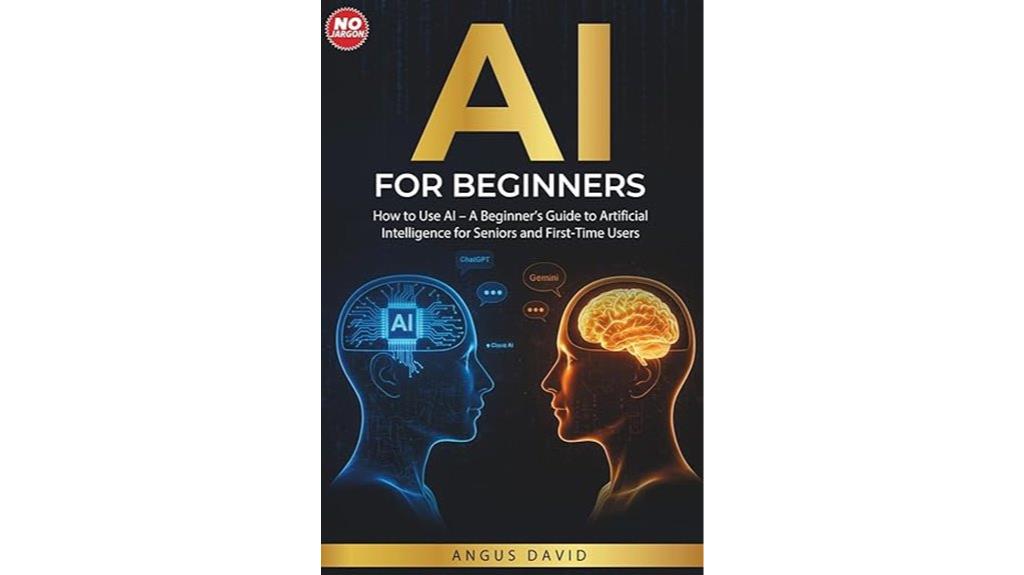
Are you new to AI and wondering how to start using it confidently? I get it—AI can seem overwhelming at first. But this guide shows you how simple it is to begin. It introduces different AI tools like chatbots, voice cloning, and image generators with clear, step-by-step instructions. You’ll learn how AI can help with tasks like content creation, organization, and even meal planning. The key is to explore and experiment without fear. I’ve found that starting small and understanding what’s possible makes AI approachable and useful, even if you’re not tech-savvy.
Best For: beginners, seniors, or non-tech-savvy individuals seeking an easy, accessible introduction to AI tools and concepts.
Pros:
- Simple, clear explanations suitable for newcomers
- Step-by-step instructions for using popular AI platforms
- Encourages exploration and hands-on learning without technical jargon
Cons:
- May not cover advanced AI features or in-depth technical details
- Limited focus on coding or developing custom AI solutions
- Some platforms or tools might require internet access or account creation
Master AI for Beginners: Develop Artificial Intelligence Basics
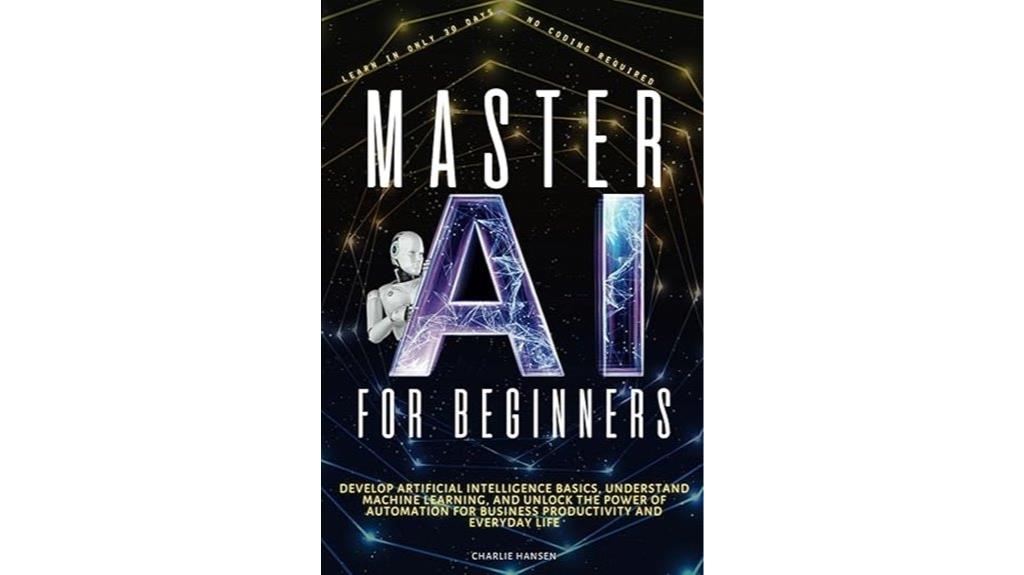
If you’re new to artificial intelligence and want a clear, accessible introduction, “Master AI for Beginners” is an ideal starting point. It offers a straightforward overview of AI, explaining how it works, its future, and real-world applications in health, business, and daily life. The book simplifies key concepts like machine learning, deep learning, and algorithms, making them easy to understand without a technical background. It encourages curiosity and practical experimentation, helping you develop a solid foundation. By grasping AI basics, you’ll open doors to innovation, productivity, and personal growth, whether you’re interested in healthcare, mental health, or career advancement.
Best For: beginners, entrepreneurs, and professionals interested in understanding AI’s fundamentals and practical applications without prior technical knowledge.
Pros:
- Provides a clear, accessible overview of complex AI concepts suitable for beginners.
- Emphasizes real-world applications in health, business, and daily life to demonstrate AI’s practical benefits.
- Encourages active learning through reflection exercises and experimentation to foster practical understanding.
Cons:
- Some sections may require rereading or additional resources for full comprehension.
- May not cover advanced AI topics in depth, limiting technical mastery for experienced learners.
- Focuses primarily on foundational concepts, so those seeking specialized or technical details might need supplementary materials.
AI Made Simple for Beginners
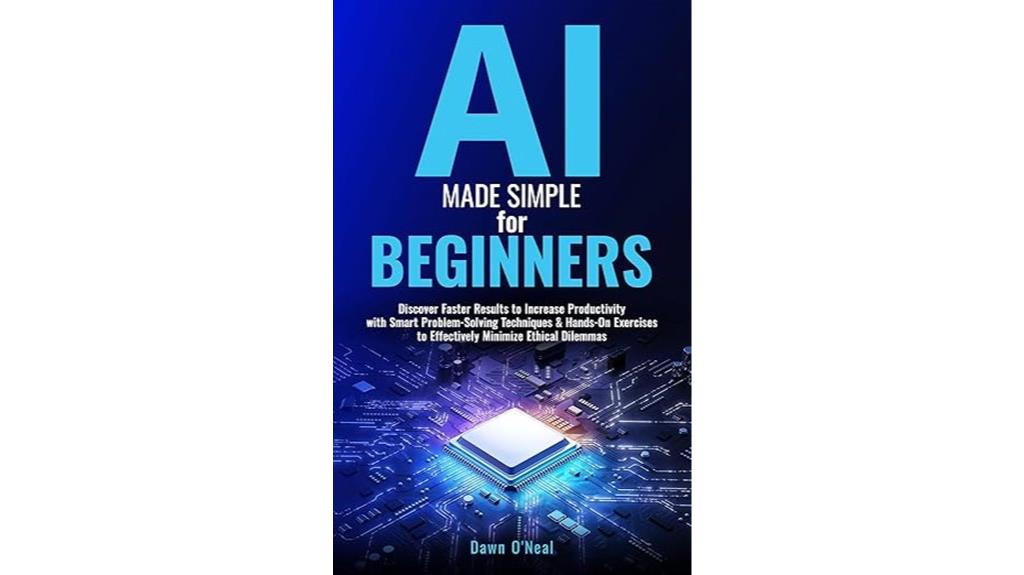
AI Made Simple for Beginners stands out as an ideal choice for newcomers enthusiastic to understand artificial intelligence without feeling overwhelmed. It simplifies complex topics with clear language, breaking down concepts, myths, and terminology into understandable parts. The book uses real-world examples and practical exercises to make learning engaging and approachable. Its well-structured content covers everything from basic AI principles to advanced applications across industries like health, finance, and art. Readers appreciate its focus on ethical considerations and future trends, making it a thorough, accessible guide. Whether you’re new to AI or looking to solidify your understanding, this book makes the journey enjoyable and manageable.
Best For: beginners and newcomers eager to understand artificial intelligence in a straightforward, accessible way without feeling overwhelmed.
Pros:
- Simplifies complex AI concepts with clear language and real-world examples
- Well-structured content covering both basic principles and advanced applications
- Emphasizes ethical considerations and future trends for a comprehensive understanding
Cons:
- Some technical sections may be challenging for complete beginners
- Lacks in-depth technical details for advanced AI practitioners
- Focuses more on overview and application rather than hands-on coding or development
The AI Workshop: Complete Beginner’s Guide to AI
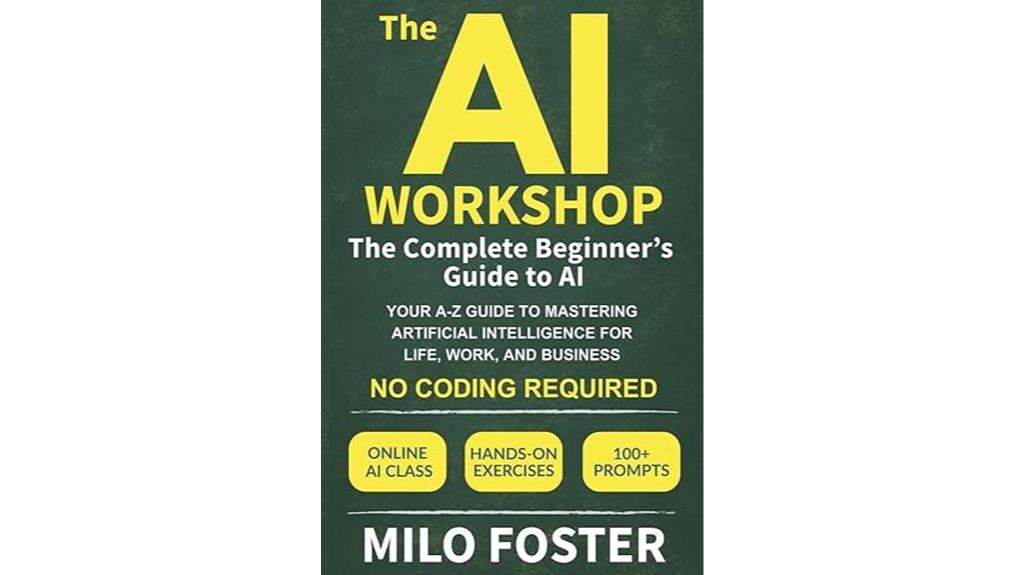
The AI Workshop by Milo Foster stands out as an ideal choice for complete beginners who want to grasp AI without prior technical knowledge. It uses clear, conversational language, avoiding jargon and complex theories, so you can easily understand key concepts. The book is organized into logical chapters with straightforward explanations and includes practical “Try it yourself” exercises to build confidence through hands-on experience. It focuses on applying AI in everyday life, work, and business, with real-world examples and step-by-step tutorials. Plus, its emphasis on ethics and privacy ensures responsible use, making it a detailed, accessible introduction to AI.
Best For: beginners with no technical background seeking a clear, practical introduction to AI for everyday and professional use.
Pros:
- Uses simple, conversational language that makes complex AI concepts easy to understand
- Emphasizes hands-on exercises and real-world applications to build practical skills
- Focuses on ethical considerations, privacy, and responsible AI use for informed adoption
Cons:
- May lack in-depth technical details for advanced users seeking deeper knowledge
- The focus on beginners might mean less coverage of specialized or niche AI topics
- Some supplementary resources might require additional effort to fully integrate into learning routines
AI for Beginners: How to Use AI – A Beginner’s Guide to Artificial Intelligence for Seniors and First-Time Users
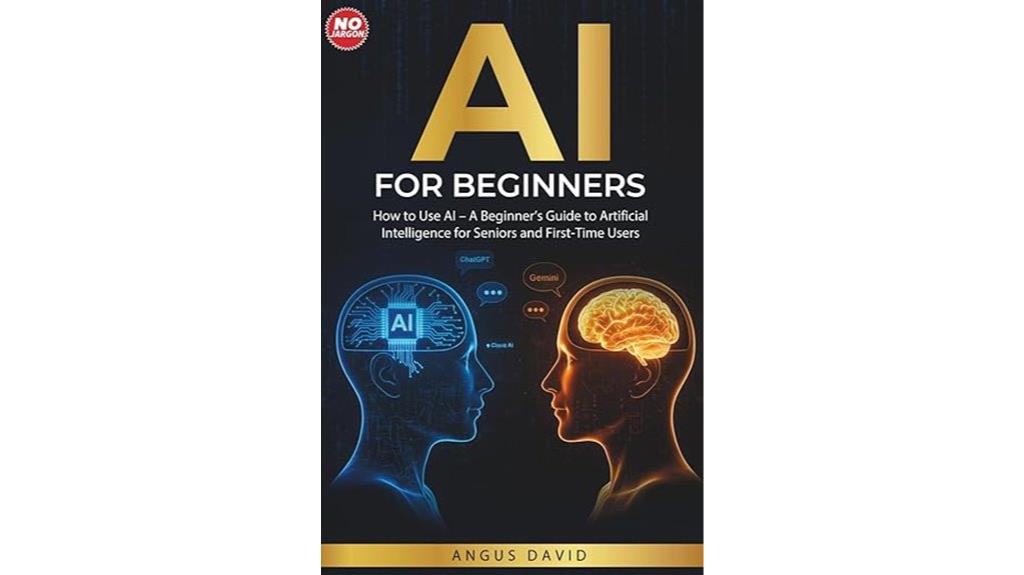
Are you a senior or someone new to technology feeling overwhelmed by artificial intelligence? This guide makes AI approachable, using simple language to explain its background, types, and everyday uses. You’ll learn how to interact with popular tools like ChatGPT, DALL·E, and voice cloning platforms, with easy step-by-step instructions and real-world examples. The book encourages exploration and confidence, emphasizing that AI is easier to start with than you might think. Whether for learning, organizing, or creative projects, it shows you how to leverage AI’s benefits while understanding its limits. It’s a friendly, practical introduction to make AI less intimidating and more useful for beginners.
Best For: seniors, non-digital natives, or anyone feeling intimidated by technology who wants a simple, friendly introduction to AI.
Pros:
- Uses clear, jargon-free language making AI accessible for beginners
- Provides step-by-step instructions and real-world examples for hands-on learning
- Encourages exploration and confidence-building in using AI tools
Cons:
- May not cover advanced AI topics or technical details for experienced users
- Focuses primarily on beginner tools, limiting depth on complex AI applications
- Some platforms or resources might require internet access or basic device familiarity
The Complete AI Guide for Beginners
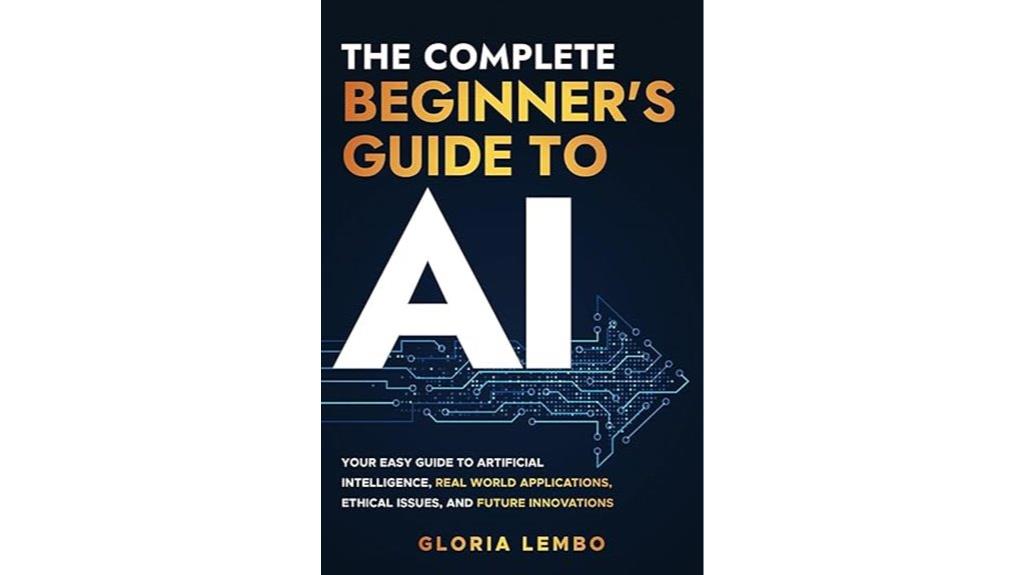
If you’re new to artificial intelligence and want a clear, accessible introduction, “The Complete AI Guide for Beginners” stands out as an ideal resource. It offers a thorough overview of AI’s history, terminology, and development levels, making complex ideas understandable for non-technical readers. The book highlights real-world examples like Alexa, ChatGPT, blockchain, and quantum computing, helping demystify how AI works behind the scenes. It also covers AI’s impact across industries, future trends, and ethical considerations, emphasizing responsible use. This book is a practical, engaging primer that builds confidence and keeps you informed about AI’s evolving role in our lives.
Best For: beginners and non-technical readers seeking a clear, comprehensive introduction to artificial intelligence and its real-world applications.
Pros:
- Accessible language that simplifies complex AI concepts for a broad audience
- Includes practical examples like Alexa, ChatGPT, blockchain, and quantum computing to enhance understanding
- Covers ethical considerations and future trends, promoting responsible AI awareness
Cons:
- Might lack in-depth technical details for advanced AI practitioners
- Some resources and opinions suggested may be subjective or opinion-based
- Focuses primarily on introductory content, which may not satisfy readers seeking specialized or cutting-edge AI research
Using Artificial Intelligence Absolute Beginner’s Guide
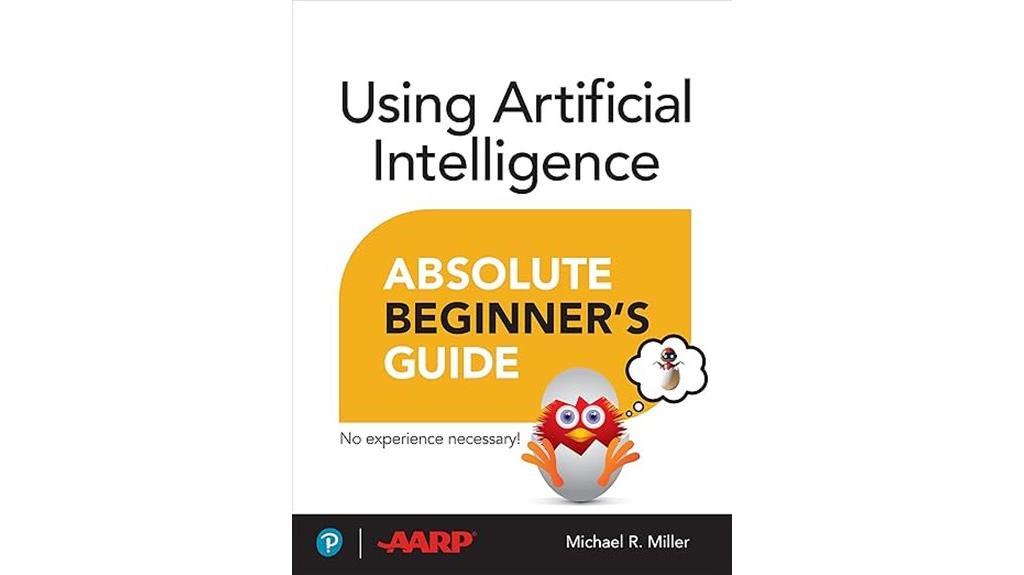
Looking for an easy-to-understand guide to get started with artificial intelligence? The “Using Artificial Intelligence Absolute Beginner’s Guide” is perfect for newcomers, especially seniors and curious learners. It’s well-written, accessible, and covers both fundamental and advanced AI concepts. I found it helpful for understanding tools and exercises, even addressing real-world issues like art gallery management. While some content overlaps online resources, the clear explanations and practical advice make it a valuable starting point. Keep in mind, AI evolves fast, so staying updated through additional resources is important. Overall, it’s a highly recommended, beginner-friendly resource to kickstart your AI journey.
Best For: beginners, seniors, and curious individuals seeking an easy-to-understand introduction to artificial intelligence.
Pros:
- Clear, age-appropriate, and accessible explanations suitable for newcomers.
- Covers both fundamental and advanced AI concepts with practical advice.
- Helpful for addressing real-world issues like art gallery management and tool usage.
Cons:
- Content may become outdated quickly due to the rapid pace of AI development.
- Some information overlaps with easily accessible online resources.
- The book may require supplementary updates or additional resources for the latest AI advancements.
AI Guide for Beginners: How to Use AI Prompts & Master Artificial Intelligence in 4 Practical Days
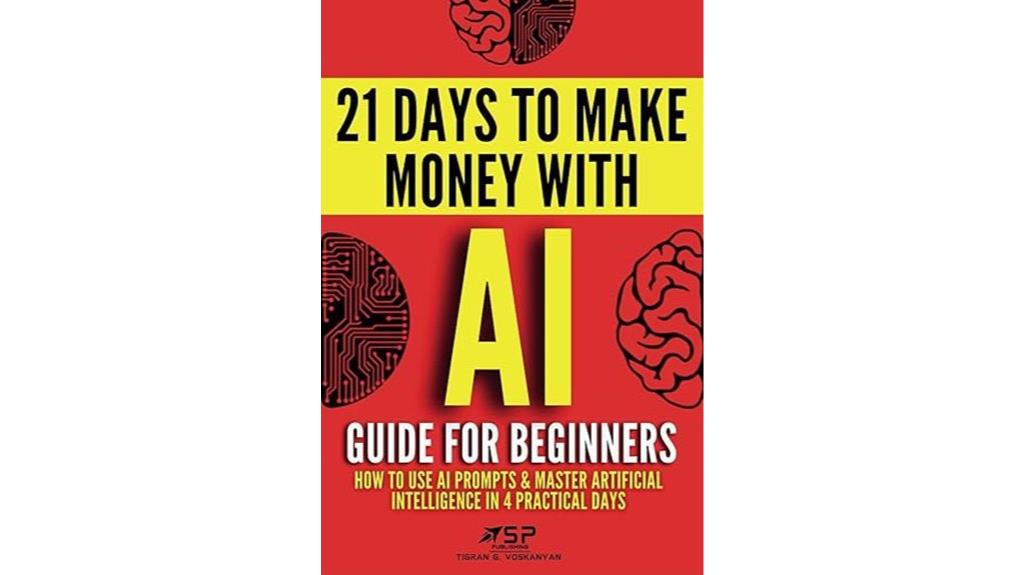
Anyone new to AI seeking a straightforward, hands-on introduction will find “AI Guide for Beginners” by Tigran Voskanyan especially valuable. This book breaks down AI concepts into a practical 4-day bootcamp, helping you master prompts and use AI confidently. Through exercises, templates, and real-world examples, it guides you step-by-step to craft effective prompts, automate tasks, and apply AI across various industries. The focus on active learning and actionable skills makes complex ideas accessible. Whether you’re aiming to boost productivity or monetize AI, this guide offers the tools and mindset shifts needed to turn beginners into proficient users in just a few days.
Best For: beginners and entrepreneurs looking for a practical, step-by-step guide to mastering AI prompts and applying AI tools for productivity and income generation.
Pros:
- Clear, actionable instructions with hands-on exercises and templates.
- Covers fundamental AI concepts alongside practical applications and monetization strategies.
- Engaging and accessible tone that demystifies complex ideas for beginners.
Cons:
- May require some prior familiarity with basic digital tools for optimal understanding.
- Focused primarily on prompt engineering and practical use cases, less on deep technical AI development.
- The 4-day bootcamp format might feel condensed for those seeking in-depth technical mastery.
AI for Seniors: A Beginners Guide to Artificial Intelligence
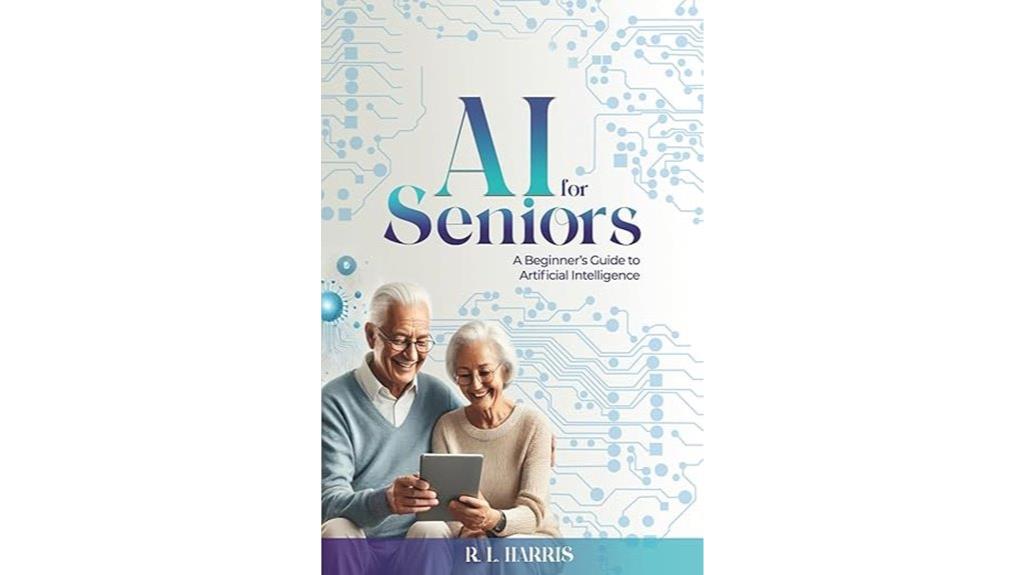
Are you a senior enthusiastic to explore artificial intelligence but unsure where to start? *AI for Seniors: A Beginners Guide to Artificial Intelligence* stands out as the perfect resource because it’s designed specifically to make complex AI concepts accessible and engaging for older adults. The book uses simple language, big fonts, and full-color illustrations, making learning easy and enjoyable. It focuses on real-life applications like preserving family histories, planning trips, and exploring hobbies, with step-by-step guides. Plus, it addresses online safety and privacy, helping you explore AI confidently and responsibly. It’s a friendly, empowering introduction to AI tailored just for seniors.
Best For: seniors who are curious about AI and want an easy, approachable introduction to understanding and applying artificial intelligence in daily life.
Pros:
- Uses simple language, large fonts, and colorful illustrations for clear understanding.
- Focuses on practical, real-world applications like preserving memories and planning trips.
- Addresses online safety and privacy, promoting responsible exploration of AI tools.
Cons:
- May lack in-depth technical details for those seeking advanced AI knowledge.
- The concise format might not cover all specific AI tools or updates in technology.
- Some seniors might prefer more interactive or digital formats beyond a printed guide.
ChatGPT Secrets Unlocked: AI Playbook for Smarter Work & Creativity
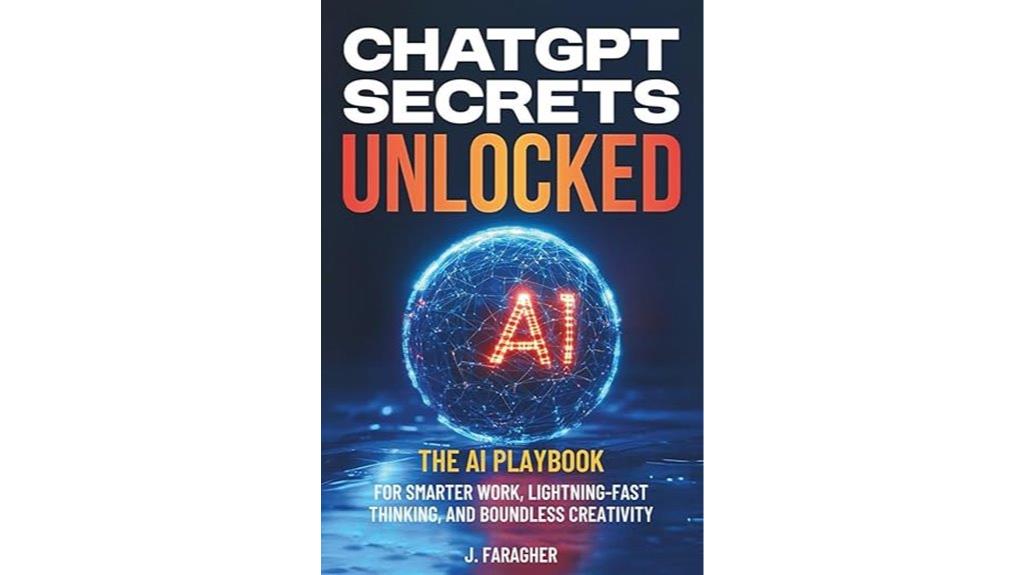
If you’re new to AI and want a practical, easy-to-understand guide, *ChatGPT Secrets Unlocked* is the perfect starting point. This book reveals how ChatGPT can boost your productivity, spark creativity, and simplify everyday tasks. It teaches you to use ChatGPT for writing emails, organizing ideas, brainstorming, and explaining complex concepts—all while emphasizing ethical use and security. I found it packed with actionable tips and real-world examples that make AI accessible. Whether you’re a student, professional, or hobbyist, this playbook helps you leverage ChatGPT as a smart assistant for work and learning, unfastening its full potential with confidence.
Best For: beginners and professionals seeking a practical, easy-to-understand guide to harnessing ChatGPT for productivity, creativity, and everyday tasks.
Pros:
- Clear explanations and real-world examples make AI accessible to all skill levels
- Practical tips for using ChatGPT in work, learning, and personal organization
- Emphasizes ethical use and security, promoting responsible AI practices
Cons:
- May not delve deeply into advanced AI concepts for experienced users
- Some tips might be too basic for seasoned AI enthusiasts
- Limited focus on technical customization or integration options
Generative AI for Beginners: Essential Guide to Artificial Intelligence
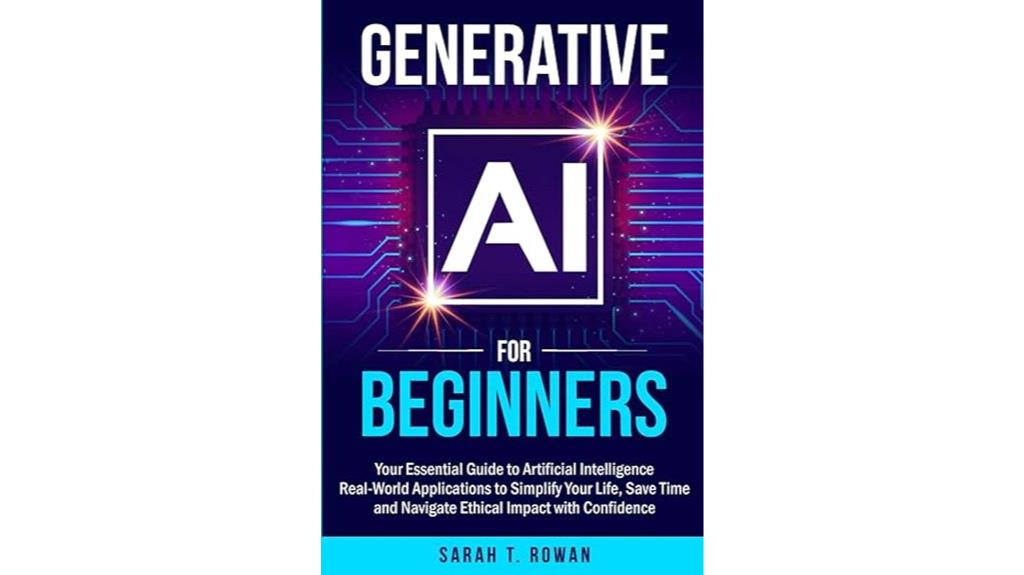
Looking to understand AI without getting lost in technical jargon? “Generative AI for Beginners: Essential Guide to Artificial Intelligence” is the perfect starting point for newcomers enthusiastic to explore AI’s practical uses. It breaks down intricate concepts into clear, simple explanations, focusing on how AI can boost productivity, creativity, and daily life. The book covers foundational principles, real-world applications like scheduling and creative projects, and ethical considerations. With practical exercises, prompt templates, and resource links, it’s designed to help you confidently implement AI tools without needing technical expertise. It’s an accessible, all-encompassing guide to beginning your AI journey in 2025.
Best For: beginners, students, professionals seeking a straightforward, practical introduction to AI without technical jargon.
Pros:
- Clear, simple explanations making complex AI concepts accessible to newcomers
- Practical exercises, prompts, and resource links to facilitate hands-on learning
- Focuses on real-world applications and ethical considerations for responsible AI use
Cons:
- Tone may be less lively or engaging for some readers despite thorough content
- Lacks in-depth technical details for advanced users seeking deeper knowledge
- Primarily designed for beginners, so it may not cover the latest cutting-edge AI developments
Generative AI: A Beginner’s Guide to Artificial Intelligence
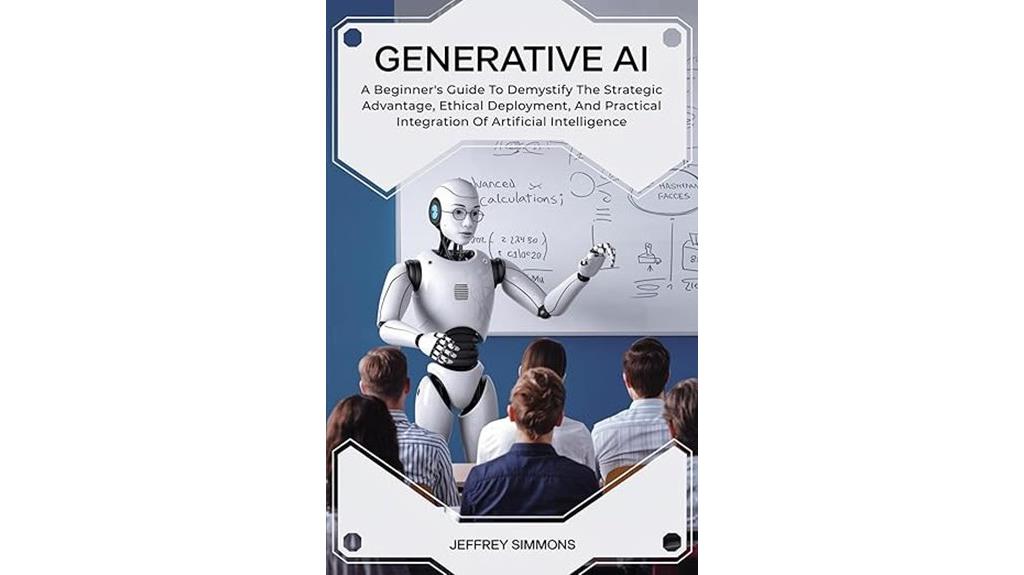
Generative AI: A Beginner’s Guide to Artificial Intelligence stands out as an ideal starting point for newcomers who want to understand how machines can create and innovate like humans. It simplifies complex ideas, explaining how AI mimics human intelligence—learning, reasoning, and language understanding—without requiring technical backgrounds. The book highlights AI’s creative potential, from generating text and images to music and media, showing its impact across industries like healthcare, education, and entertainment. With practical examples and a focus on ethical use, it provides a clear, accessible foundation for anyone curious about how AI can enhance their personal and professional lives.
Best For: beginners and non-technical individuals seeking a clear, accessible introduction to AI concepts, practical applications, and ethical considerations.
Pros:
- Simplifies complex AI ideas with accessible language suitable for beginners
- Provides practical examples and real-world insights to enhance understanding
- Emphasizes ethical use and societal impacts, promoting responsible AI engagement
Cons:
- Some sections may feel slow or overly detailed for quick readers
- Lacks in-depth technical explanations for those seeking advanced knowledge
- Focuses more on broad concepts than on hands-on implementation or coding
Master AI for Beginners: Develop Artificial Intelligence Basics, Understand Machine Learning, and Unlock the Power of Automation for Business Productivity, and Everyday Life
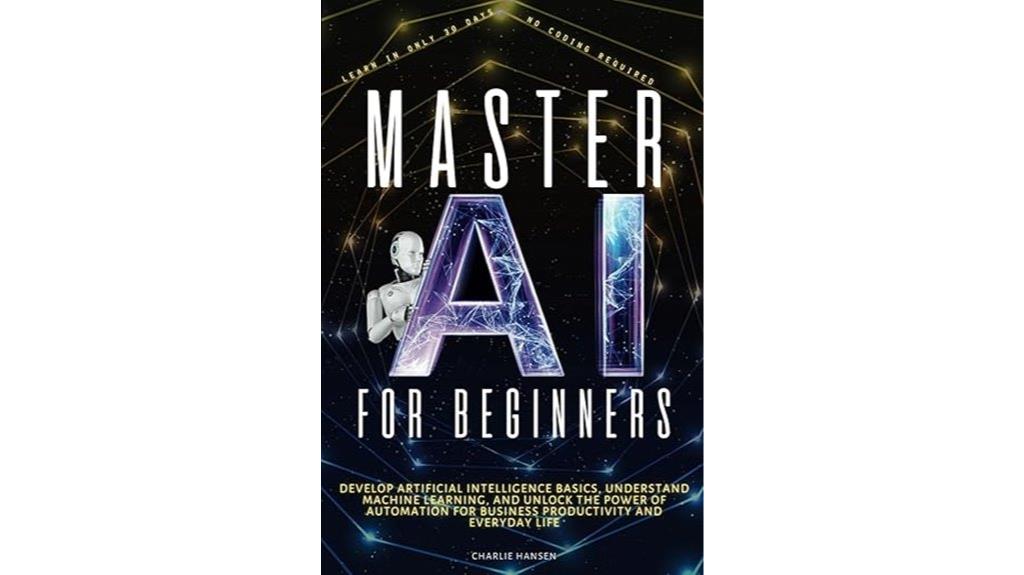
Are you new to AI and enthusiastic to understand its fundamentals without getting overwhelmed by technical jargon? I get it—AI can seem complex, but mastering the basics opens up endless possibilities. This guide helps you grasp core concepts like machine learning, algorithms, and automation, making them accessible and practical. You’ll learn how AI boosts productivity in business and improves daily life through health monitoring, mental health apps, and smart devices. By exploring real-world use cases, you’ll see how AI can streamline tasks, foster innovation, and create new opportunities. No prior technical background needed—just curiosity and a desire to *access* AI’s potential.
Best For: beginners interested in understanding AI fundamentals, improving productivity, and exploring practical applications without prior technical knowledge.
Pros:
- Provides clear, beginner-friendly explanations of complex AI concepts
- Focuses on real-world applications that are relevant to daily life and business
- Encourages active learning through reflection and practical experimentation
Cons:
- Some sections may require rereading or additional resources for full comprehension
- Simplified explanations might omit advanced technical details for more experienced learners
- Not a comprehensive technical guide, focusing more on foundational understanding and practical use cases
Factors to Consider When Choosing an AI for Beginners Book

When selecting an AI book for beginners, I consider how clearly it explains concepts and whether the depth matches my knowledge level. I also look for practical examples I can apply and guarantee it addresses ethical issues in AI. Additionally, I pay attention to the design and layout to make learning more engaging and accessible.
Clarity of Content Depth
Choosing an AI for beginners book with the right content depth means finding a balance between simplicity and detail. I look for books that introduce core concepts using accessible language, avoiding overwhelming technical jargon. It’s important that complex topics are gradually built up, so I can follow along without gaps or confusion. A good beginner book offers enough detail to deepen my understanding without becoming overly technical or intimidating. Visual aids, clear explanations, and practical examples help me grasp AI principles more effectively. Additionally, I appreciate when the coverage of limitations and ethical considerations is appropriate for beginners, promoting responsible exploration without misinformation. Ultimately, the ideal book makes learning engaging and manageable, ensuring I build confidence as I progress.
Target Audience Fit
Selecting an AI beginner’s book that genuinely fits your needs requires considering how well it caters to your background and goals. First, check if the book is designed for beginners, using clear language and minimal jargon. If you’re a non-digital native or senior, ensure it offers accessible explanations and visual aids to simplify complex concepts. It’s also important to verify that the content aligns with your goals—whether you want practical skills, theoretical knowledge, or ethical insights. Avoid books aimed at advanced users or those with heavy technical focus. Additionally, see if the book addresses your specific concerns, like privacy or ease of use. Choosing a book tailored to your experience level and interests guarantees a smoother, more engaging learning journey.
Practical Application Focus
Focusing on practical application is essential when picking an AI beginner’s book, as it guarantees you can apply what you learn immediately. Look for books that include exercises, prompts, or step-by-step guides to reinforce hands-on learning. I recommend resources that demonstrate real-world AI use cases, showing how these tools can be integrated into everyday tasks and projects. Choose titles that are written in clear, jargon-free language to build confidence and understanding, especially if you’re new to tech. It’s also helpful to find books offering straightforward instructions on using AI platforms, so you can start practicing right away. Ultimately, a good beginner’s book should highlight ethical considerations and safety tips, ensuring responsible and informed AI use from the outset.
Ethical Guidance Provided
Since responsible AI use is vital for beginners, I look for books that provide clear ethical guidance. These books help me understand how to use AI responsibly, emphasizing privacy protection and data security. They often discuss common dilemmas like bias, misinformation, and societal impacts, making me aware of potential pitfalls. Clear explanations of ethical principles encourage me to adopt fair and transparent practices when working with AI tools. I also value practical advice on avoiding misuse and recognizing AI’s limitations, which builds my confidence in applying AI responsibly. Emphasizing ethics ensures I develop a balanced perspective, fostering trust and accountability. Overall, a book with solid ethical guidance is indispensable for a responsible and informed AI learning journey.
Visual and Layout Design
When choosing an AI for beginners book, paying attention to visual and layout design can make a big difference in how easily I grasp complex concepts. A well-organized layout with clear headings and subheadings helps me navigate topics without feeling overwhelmed. Large, readable fonts and enough spacing reduce eye strain and make content accessible. Visual aids like diagrams, charts, and illustrations clarify abstract ideas, making them easier to understand. Consistent color schemes and visual cues highlight key points and break up dense text, guiding my focus. A balanced mix of text and visuals keeps the learning engaging and caters to different learning styles. Overall, good visual and layout design turns a potentially confusing book into a clear, enjoyable learning experience.
Supplementary Learning Resources
Choosing an AI for beginners book isn’t just about the content inside; it’s also about the extra resources that can boost your learning. Online tutorials, video courses, and community forums complement the book, offering practical experience and deeper understanding. Access to downloadable prompts, exercises, and quizzes help reinforce key concepts and improve retention. Curated lists of reputable websites, blogs, and industry articles keep you updated on the latest trends and tools. Interactive platforms that allow hands-on experimentation with AI models can accelerate your skills and build confidence. Additionally, resources like case studies and real-world examples connect theory to practice, making complex ideas more relatable. These supplementary tools are essential for a well-rounded, engaging learning journey in AI.
Frequently Asked Questions
How Do I Choose the Right AI Book for My Skill Level?
When choosing an AI book, I first consider my current skill level. If I’m new, I look for beginner-friendly titles that explain concepts clearly without jargon. If I have some experience, I pick books that explore deeper into algorithms or applications. I also check reviews to see if the book matches my goals, whether it’s hands-on projects or theory. This way, I guarantee the book helps me learn effectively without feeling overwhelmed.
Are These AI Books Suitable for Non-Technical Beginners?
Imagine starting a new adventure without a map—these AI books are like friendly guides for non-technical beginners. I’ve found many are designed to be approachable, breaking down complex ideas into simple concepts. They’re perfect if you’re just beginning and want to learn without feeling overwhelmed. So yes, these books are suitable for non-techies looking to explore AI, making your journey exciting and manageable from the very start.
Do These Books Cover Ethical Considerations in AI?
I understand your concern about ethical considerations in AI. Many beginner books now include dedicated sections on ethics, covering topics like bias, privacy, and responsible AI use. While some focus more on technical basics, I look for books that balance foundational knowledge with ethical discussions. If you’re interested, I can recommend specific titles that emphasize these important ethical issues alongside technical learning.
Can I Learn AI Without Prior Programming Experience?
They say you can’t teach an old dog new tricks, but I believe anyone can learn AI without prior programming experience. I started with beginner-friendly courses and books that explain concepts clearly, step by step. I practiced regularly, and now I understand the basics. So, don’t be discouraged—learning AI is a journey, not a race. With patience and the right resources, you’ll get there!
Are There Recommended Supplementary Resources for Advanced Learning?
Absolutely, I recommend exploring online courses, tutorials, and research papers for advanced learning. I often turn to platforms like Coursera or edX for in-depth classes, and I follow industry blogs and forums to stay updated. Hands-on projects and Kaggle competitions help me apply what I learn. These resources challenge me and deepen my understanding, making my AI journey more thorough and engaging.
Conclusion
Starting your AI journey has never been easier, especially with these top beginner books. Did you know that by 2025, over 60% of jobs will require some AI understanding? Whether you’re into automation, machine learning, or just curious, these books will guide you every step of the way. So, why wait? Immerse yourself today and access the incredible potential AI has to offer for your career and daily life!









